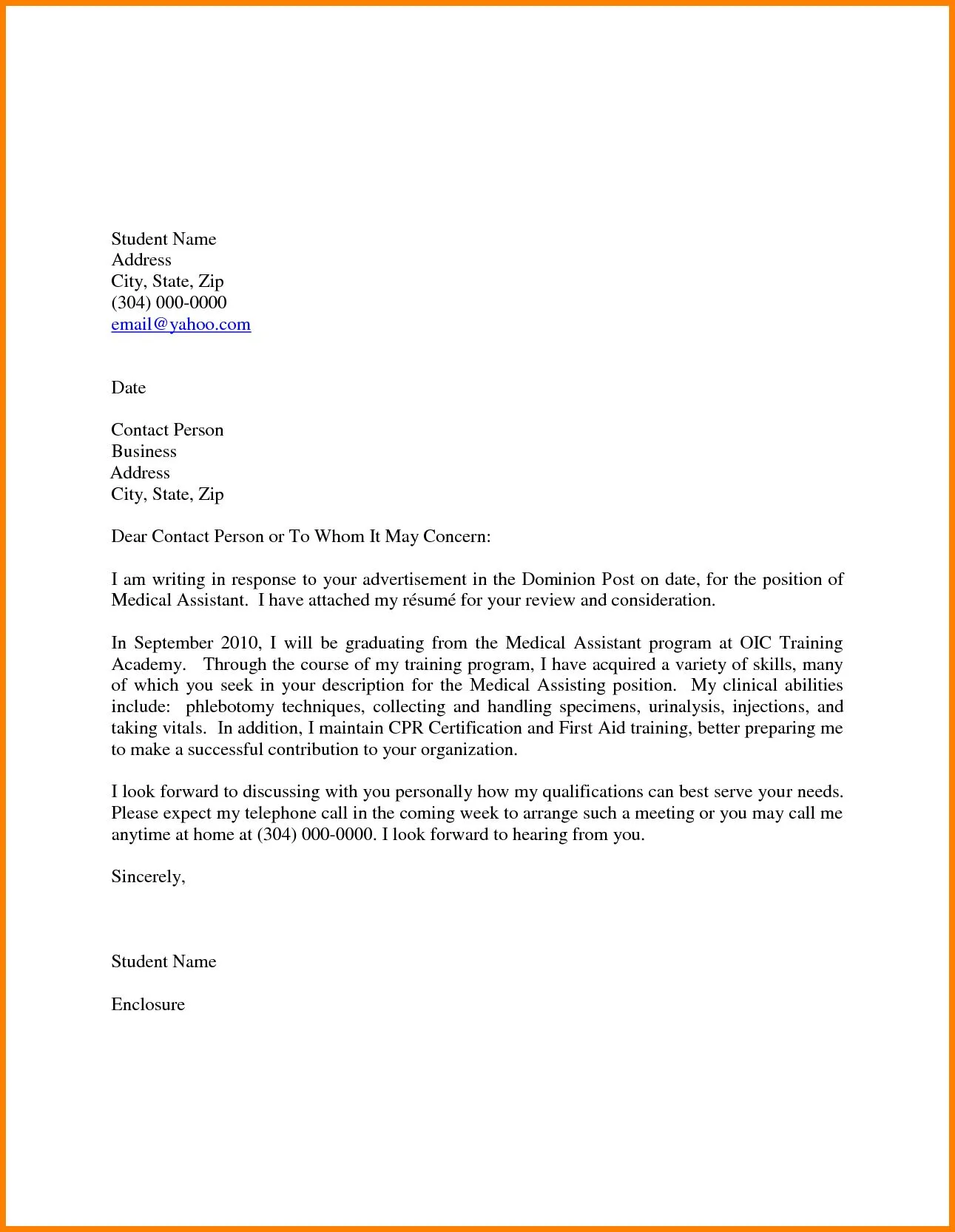Why a Cover Letter Matters for Assistants
In the competitive job market, a well-crafted cover letter can be your secret weapon, especially when applying for an assistant position. It serves as your first introduction to a potential employer, offering a space to showcase your personality, skills, and enthusiasm beyond what a resume can convey. It provides context to your experience, allowing you to connect your past accomplishments to the specific requirements of the job. A strong cover letter demonstrates your communication skills and attention to detail, qualities highly valued in assistant roles. Essentially, it is your opportunity to make a memorable first impression and persuade the hiring manager that you are the ideal candidate. Failing to include a cover letter, or submitting a generic one, can be a missed opportunity to distinguish yourself from other applicants, potentially leading to your application being overlooked.
Understanding the Role of an Assistant
Before you write your cover letter, understand what the role of an assistant typically entails. Assistants provide crucial support to executives, teams, or individuals, managing administrative tasks, coordinating schedules, and ensuring smooth operations. The specific duties vary depending on the role and industry but often include managing communications, preparing documents, organizing meetings, and handling various administrative functions. Consider what skills are most important in this type of role. Executive assistants may focus more on calendar management, travel arrangements, and project coordination, while administrative assistants might be involved in data entry, record-keeping, and customer service. Knowing the specific responsibilities of the position you are applying for allows you to tailor your cover letter effectively, highlighting the relevant skills and experiences that demonstrate your ability to excel in that role.
Key Skills to Highlight
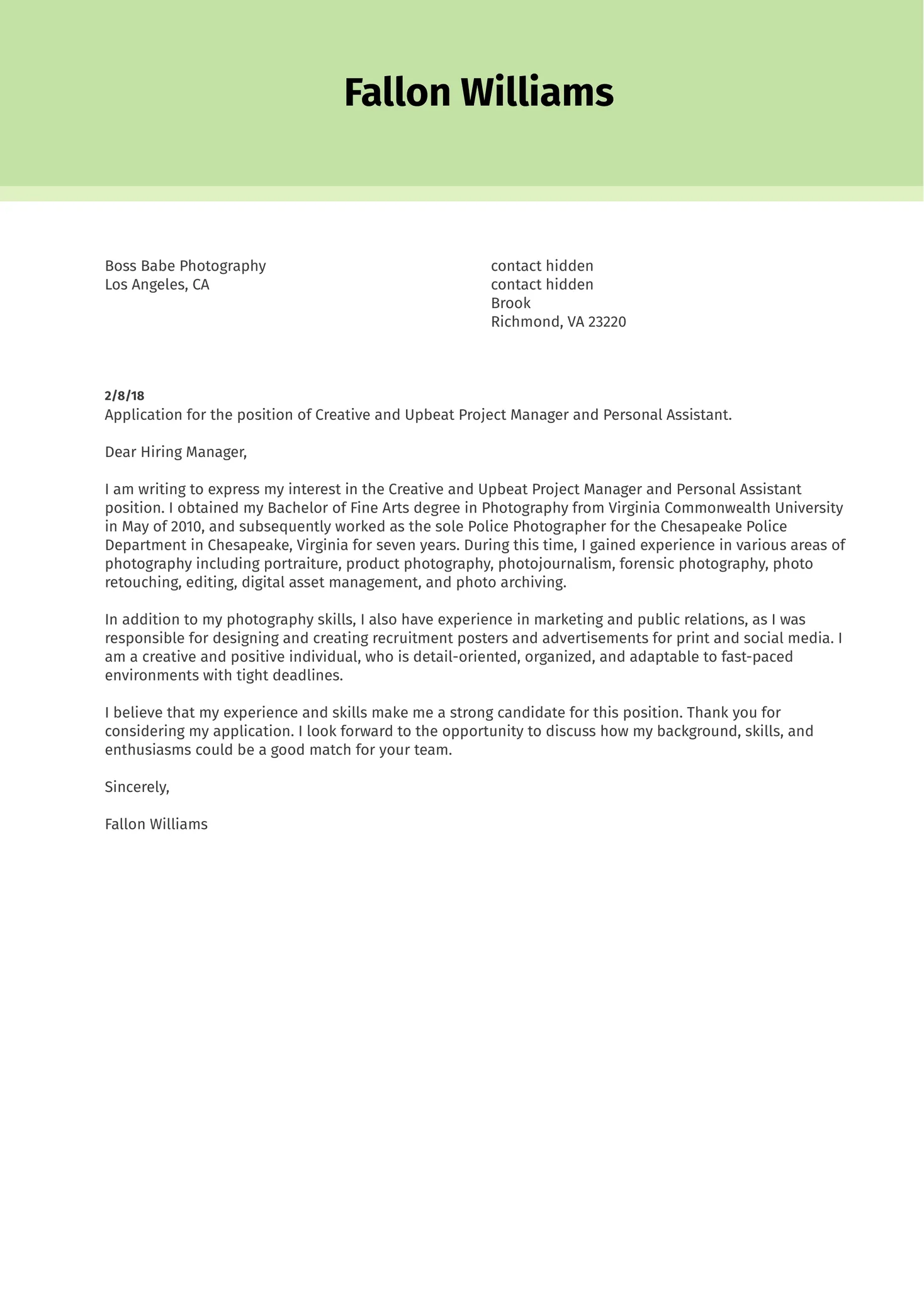
When crafting your cover letter, emphasize skills that are crucial for success in an assistant role. These skills often overlap but should be tailored to the specific job description. Highlight your proficiency in communication, organizational skills, and technical abilities. Include specific examples of how you have utilized these skills in previous roles or situations. Quantifying your achievements, such as the number of meetings coordinated or the efficiency gained through process improvements, can significantly strengthen your application. Always align your skills with the requirements outlined in the job description, ensuring you are showcasing the most relevant qualifications for the position.
Communication Skills
Excellent communication skills are paramount for assistants, who frequently interact with internal and external stakeholders. Highlight your written and verbal communication abilities, including your ability to draft professional emails, compose clear and concise reports, and effectively communicate with clients, colleagues, and superiors. Provide examples of how you have used your communication skills to resolve conflicts, disseminate information, or build rapport. For instance, you could mention experience in crafting compelling presentations, facilitating meetings, or managing correspondence to ensure clear and consistent messaging.
Organizational Skills
Assistants must be highly organized to manage multiple tasks, deadlines, and priorities simultaneously. Showcase your organizational abilities by providing examples of how you have managed calendars, organized files, and maintained efficient systems. Consider mentioning experience in project management, time management, or creating and maintaining databases. Focus on demonstrating your ability to prioritize tasks, meet deadlines, and manage details, ultimately contributing to operational efficiency and the successful execution of projects. Mention specific software or organizational systems that you are familiar with.
Technical Proficiency
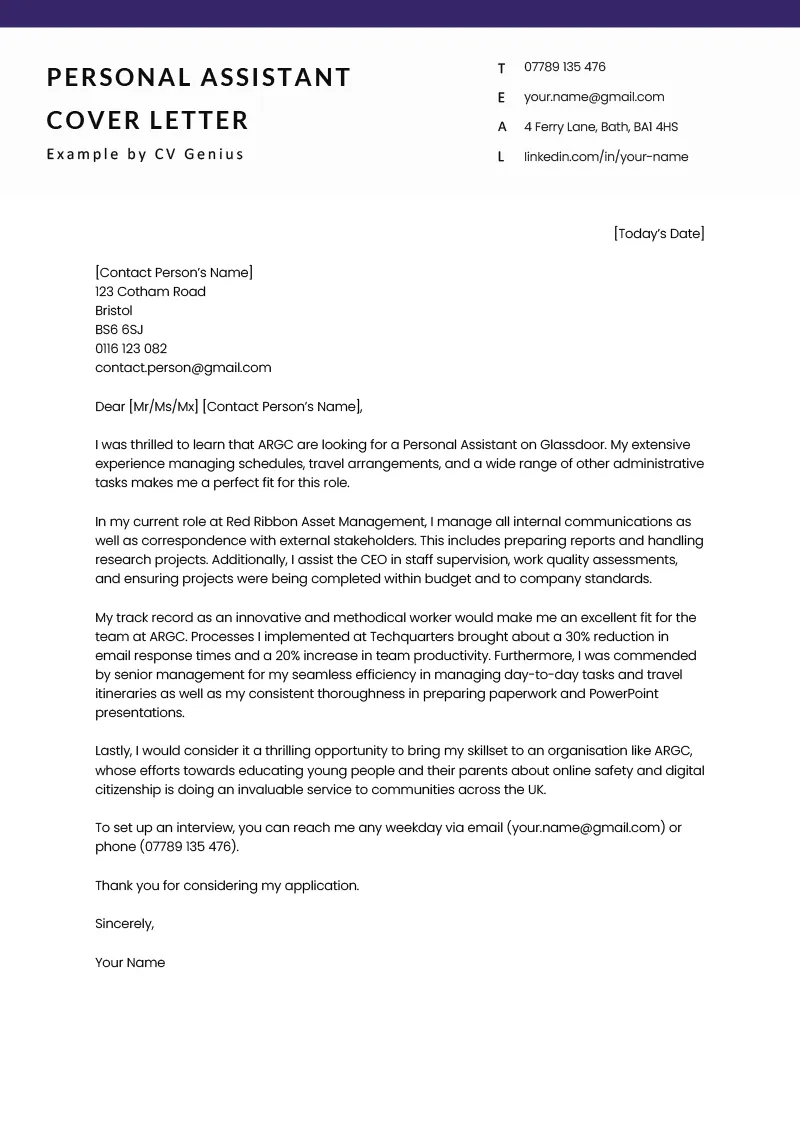
Technical proficiency is essential for most assistant roles. Mention your competence in relevant software and tools, such as Microsoft Office Suite (Word, Excel, PowerPoint, Outlook), Google Workspace, CRM systems, and other industry-specific applications. If the job description mentions specific software, be sure to include those in your cover letter. Demonstrate your ability to quickly learn new software, troubleshoot technical issues, and adapt to changing technologies. Even if you don’t have experience with a specific tool, express your willingness to learn and your comfort with technology.
Crafting a Compelling Cover Letter
A compelling cover letter is well-structured, concise, and customized to the specific job and employer. Make it easy to read, and ensure it quickly highlights your key qualifications and how they align with the employer’s needs. Avoid simply repeating your resume; instead, elaborate on relevant experiences and skills. Use action verbs to describe your accomplishments. Highlight your enthusiasm for the position and the organization. Show that you have researched the company and understand its values and goals. Keep it brief and to the point, aiming for no more than one page. Proofread meticulously for any errors in grammar or spelling.
Formatting Your Cover Letter
Proper formatting makes your cover letter easy to read and enhances your professional presentation. A well-formatted cover letter demonstrates attention to detail, a crucial skill for assistants. Choose a professional font like Arial or Times New Roman, with a font size between 10 and 12 points. Use single spacing within paragraphs and double spacing between paragraphs to improve readability. Maintain consistent margins (typically 1 inch on all sides). Ensure your letter is neatly aligned, with a clear header, greeting, body paragraphs, and closing.
Header and Contact Information
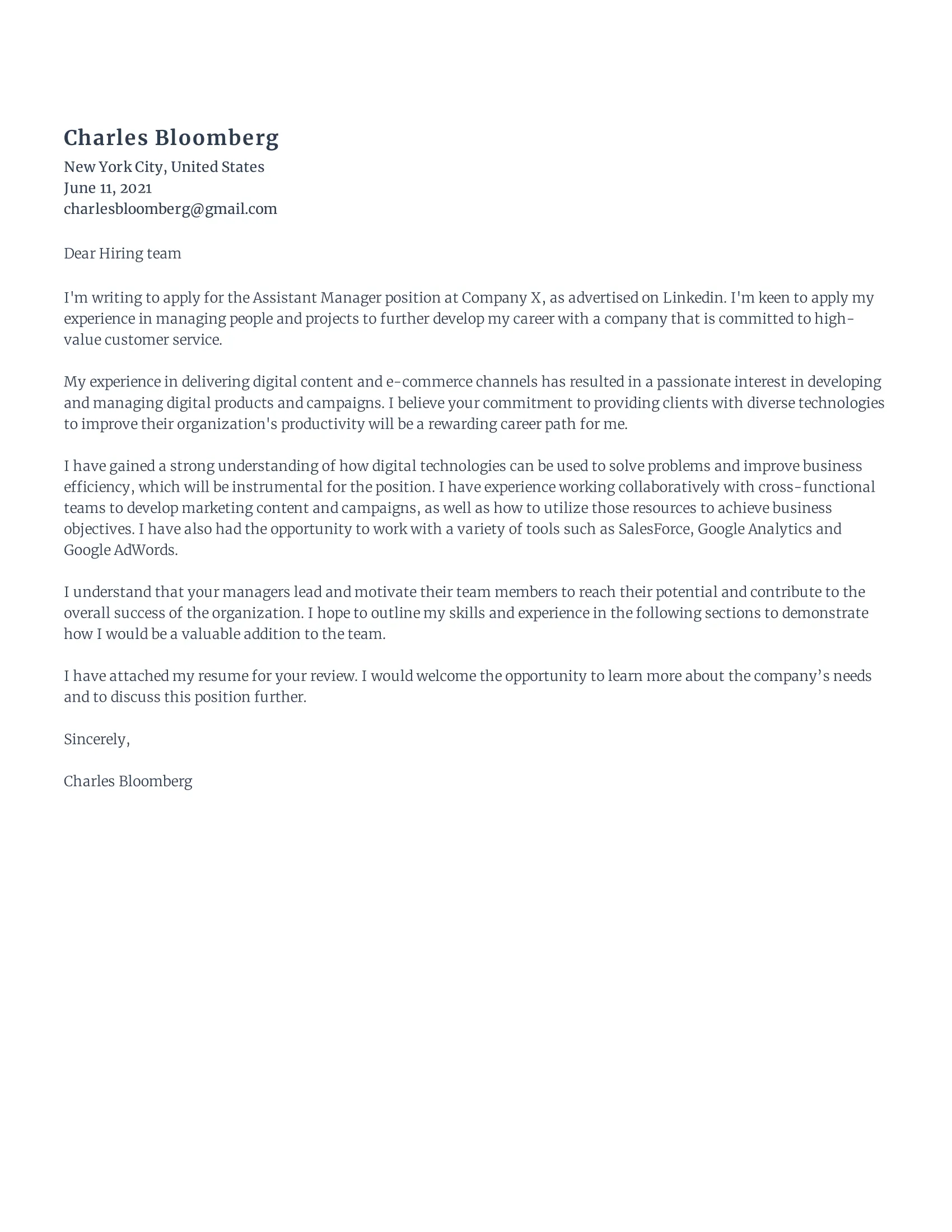
Your cover letter should begin with a header that includes your contact information: your full name, phone number, email address, and optionally, your LinkedIn profile URL. Place the date below your contact information. Then, include the hiring manager’s name and title (if available) and the company’s address. Proper header formatting ensures the recruiter or hiring manager can easily contact you and shows professionalism.
Professional Greeting
Start your cover letter with a professional greeting. If you know the hiring manager’s name, use ‘Dear Mr./Ms./Mx. [Last Name]’. If you are unsure of the hiring manager’s name, you can use a general greeting such as ‘Dear Hiring Manager’ or ‘Dear [Company Name] Hiring Team’. Avoid overly casual greetings such as ‘Hello’ or ‘Hi’.
The Opening Paragraph
The opening paragraph is your chance to grab the hiring manager’s attention. State the position you are applying for and how you found the job. Briefly introduce yourself and express your enthusiasm for the role and the company. Consider stating a key accomplishment or skill that directly aligns with the job requirements. Keep it concise and engaging, setting the tone for the rest of your letter. The initial paragraph should spark interest and encourage the reader to continue.
Highlighting Your Skills and Experience
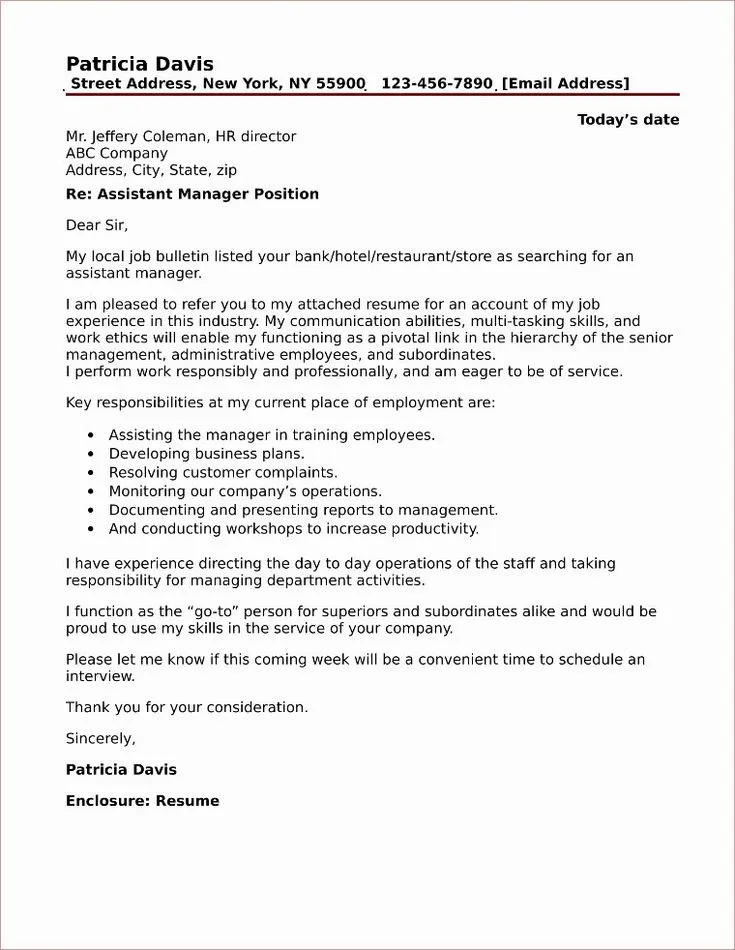
In the body of your cover letter, provide specific examples of your relevant skills and experience. Explain how your past experiences have prepared you for the assistant position. Use the STAR method (Situation, Task, Action, Result) to provide context, describe the challenge, explain your actions, and highlight the positive outcome. Focus on accomplishments that showcase your communication skills, organizational abilities, and technical proficiency. Quantify your achievements whenever possible. For example, state the number of projects you managed, the efficiency improvements you implemented, or any cost savings you achieved.
Quantifying Your Achievements
Quantifying your achievements adds credibility to your cover letter. Instead of saying ‘I improved office efficiency,’ state, ‘I streamlined the filing system, resulting in a 20% reduction in document retrieval time.’ Numbers and percentages make your accomplishments more impactful and demonstrate your ability to deliver tangible results. Consider using metrics such as the number of projects completed, the number of people supported, or the amount of money saved or earned through your efforts. Providing concrete examples of your achievements shows that you are results-oriented.
Tailoring Your Letter to the Job
Customizing your cover letter for each job application is crucial for demonstrating your interest and suitability. Carefully review the job description and identify the key requirements and desired skills. Align your cover letter content with these specific needs by emphasizing the skills and experiences that are most relevant to the role. Research the company and tailor your letter to reflect its values and goals. Showing that you understand the company’s needs and how you can contribute to its success will make your application stand out.
Addressing the Employer’s Needs
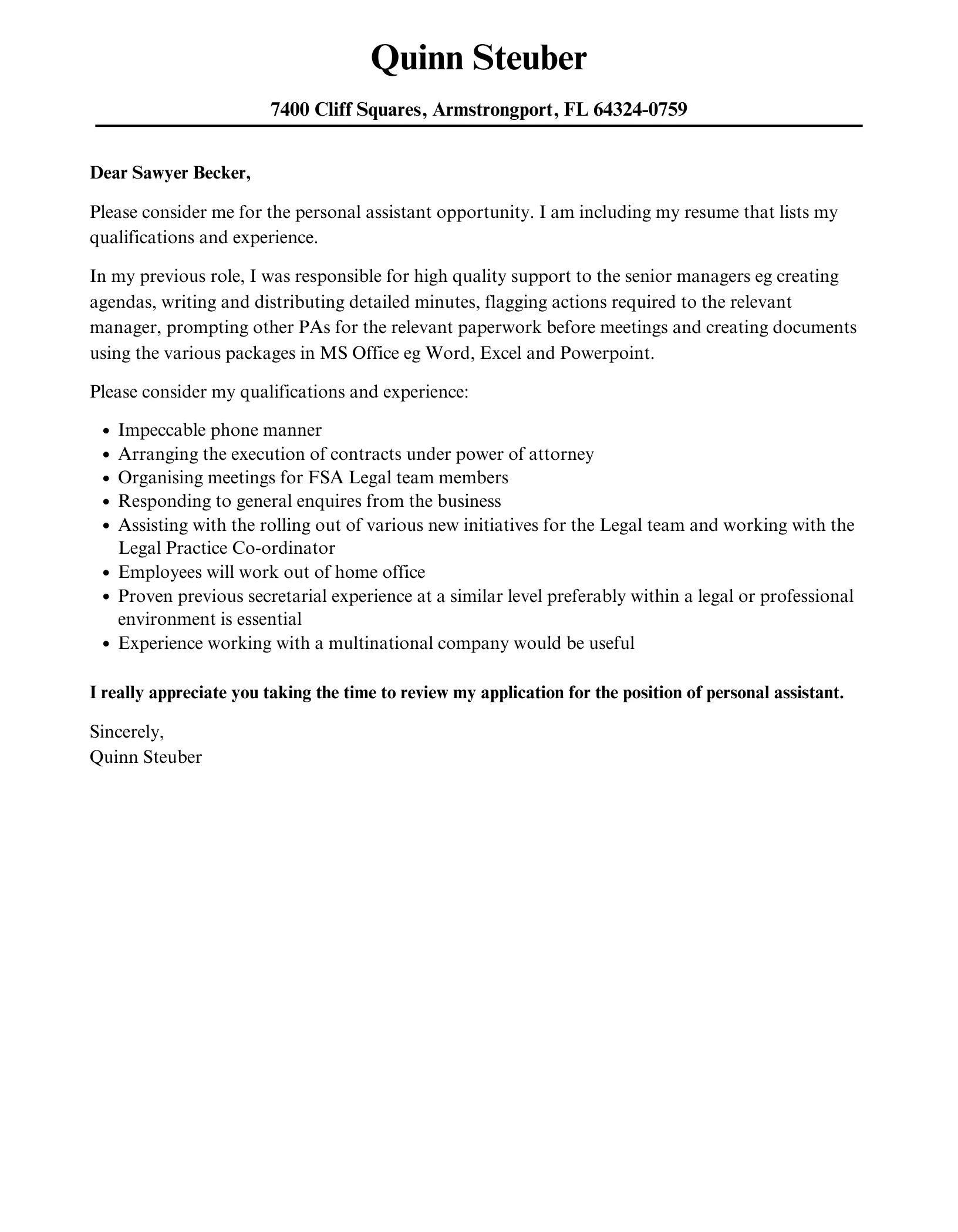
Show the employer that you understand their needs. Explain how your skills and experience will help them overcome challenges or achieve their goals. For example, if the job description emphasizes organizational skills, highlight your experience in managing complex schedules or coordinating multiple projects. Demonstrate your problem-solving abilities and your capacity to contribute to the company’s success by addressing specific areas of their business. Always address the employer’s needs throughout the cover letter.
The Closing Paragraph
The closing paragraph is your opportunity to reiterate your interest in the position and express your enthusiasm. Thank the hiring manager for their time and consideration. State your availability for an interview and provide contact information. Avoid generic phrases; instead, use a confident and professional tone. End with a call to action, such as ‘I am eager to discuss how my skills and experience can benefit your organization’ or something similar, showing your eagerness to contribute.
Expressing Enthusiasm and Next Steps
Conclude your cover letter by expressing your enthusiasm for the role and the company. Briefly reiterate why you are a good fit for the position and what you hope to achieve. State your availability for an interview and express your willingness to provide additional information if needed. Close with a professional closing, such as ‘Sincerely’ or ‘Best regards,’ followed by your typed name.
Proofreading and Editing
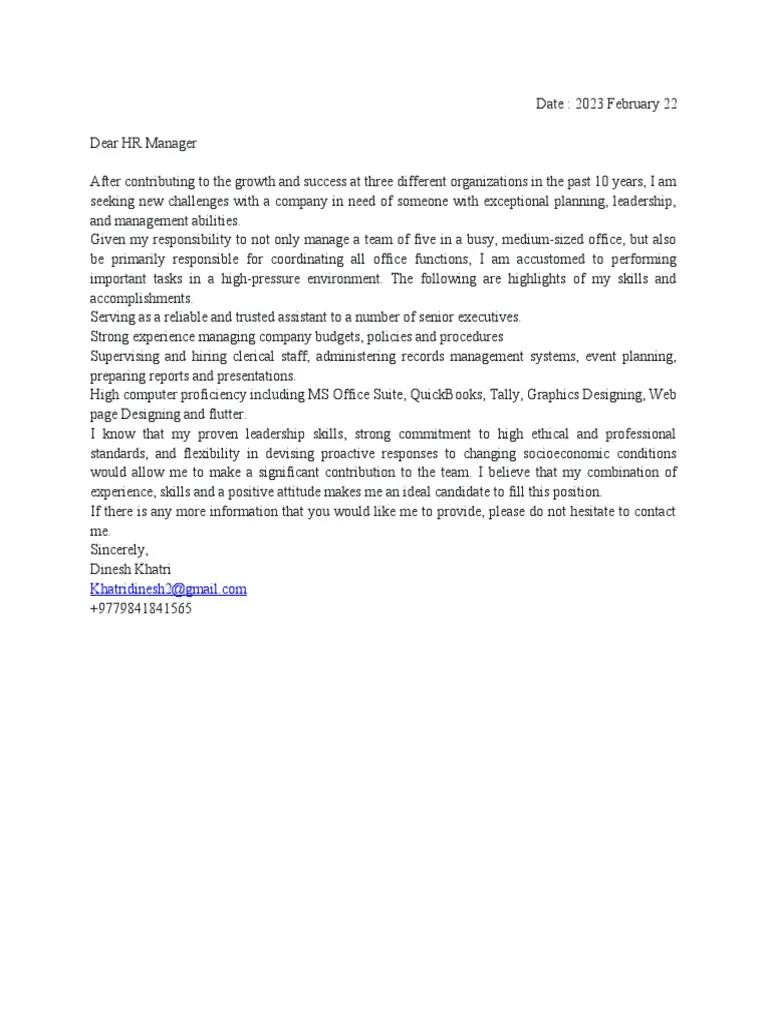
Proofreading and editing are critical steps in the cover letter writing process. Before submitting your cover letter, carefully review it for any errors in grammar, spelling, punctuation, and formatting. Have a friend, colleague, or career advisor review your letter for a fresh perspective. Ensure that your writing is clear, concise, and free of any typos or grammatical errors. Errors can undermine your credibility and create a negative impression.
Cover Letter Examples for Assistants
Reviewing cover letter samples can provide valuable insights into structure, content, and style. Use these examples as a guide, but remember to customize your letter to reflect your unique skills and experiences. Adapt the language and content to align with the specific job and the company’s culture. Here are some examples to get you started.
Example 1 Administrative Assistant
This is a sample of a good cover letter for an administrative assistant position. It should include the applicant’s experience with scheduling, communication, and other important administrative tasks. Adapt it to fit your personal experience and the job description.
Example 2 Executive Assistant
This example cover letter focuses on executive assistant roles. It will emphasize experience with calendar management, travel arrangements, and supporting high-level executives. Tailor this to reflect your own experience. Adjust the content to reflect your individual skills and experiences, as well as the job’s requirements.
Common Mistakes to Avoid
Avoid common mistakes to enhance your cover letter. Refrain from using generic language, which does not highlight your particular experiences or skills. Proofread your letter carefully to eliminate any typos or grammatical errors. Ensure that you tailor your letter to the specific job; otherwise, it won’t resonate with the hiring manager.
Generic Language
Avoid using generic language that could apply to any candidate. Use specific examples from your experience. Show how you have applied your skills and achieved concrete results. Use action verbs to showcase what you’ve done. Avoid clichés or overused phrases that can make your cover letter seem impersonal or uninspired.
Typos and Grammatical Errors
Carelessly written cover letters with typos or grammatical errors undermine your professionalism. Before submitting your cover letter, proofread it carefully. Use spell-check and grammar-check tools, and have a trusted friend or colleague review it. Ensure that your writing is clear, concise, and free from errors.
Failing to Tailor the Letter
Sending a generic cover letter to multiple job applications is a common mistake. Customize your cover letter to match the specific job requirements and the company’s culture. Research the company and demonstrate your knowledge of its goals and values. Tailoring the letter to each job application increases your chances of being selected.
Final Thoughts on Cover Letters
A well-crafted cover letter is essential for assistant job applications. It should showcase your skills, experience, and enthusiasm in a professional manner. Follow the guidelines provided in this guide to create a compelling cover letter. Customize your letter to each job, proofread carefully, and always express your interest in the role. By investing time and effort into your cover letter, you can significantly increase your chances of securing an interview and landing your desired assistant position. Always follow up after submitting your application, and be prepared to discuss your skills in detail.
Resources for Further Assistance
Utilize available resources to refine your cover letter and job application strategies. Career services, online templates, and professional resume writers can provide expert guidance. There are numerous online resources, such as sample cover letters, writing guides, and interview preparation tips, available to assist job seekers. Seek advice from career counselors, who can provide personalized feedback. Professional resume writers can help you showcase your skills and experience. These resources can make the application process easier.
